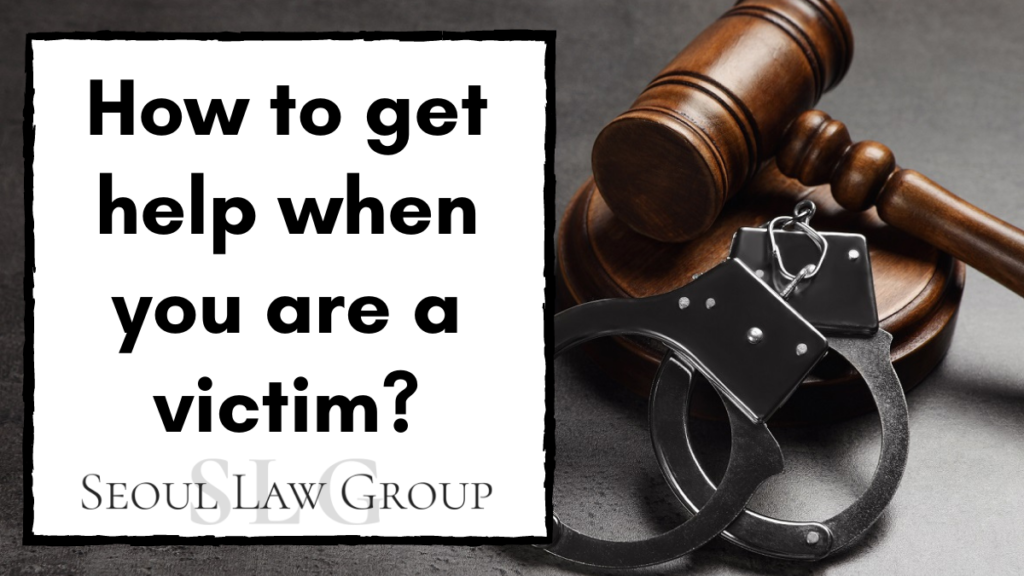Domestic Crimes in Korea: How to get help when you are a victim
Most of crimes included in “domestic violence” in Korea are covered and punished by ordinary Criminal Act of Korea: such as assault, inflicting bodily injury, abandonment, intimidation, rape, or coercion.

Table of Contents
Domestic Violence in Korea: How to Get help?
But still, such crimes done by family members should be treated differently, and that’s why Korea has many legal measures prescribed by law especially for domestic violence cases. The most important examples are “Act on Special Cases Concerning the Punishment, etc. of Crimes of Domestic Violence (가정폭력범죄의 처벌 등에 관한 특례법)” and “Act on the Prevention of Domestic Violence and Protection, etc. of Victims (가정폭력방지 및 피해자보호 등에 관한 법률).” They are called “Act on Punishment of Domestic Violence” and “Act on Prevention of Domestic Violence” in short.
1. Help Lines
First, let’s see where the victim should call when they are a victim of domestic violence. Of course they can call 112, the Korean police emergency number, but there are other hotlines for victims of domestic violence, in case the victim wants some counselling instead of reporting the crime right away.
- Women’s hotline: 1366
- Korean Legal Aid Center for Family Relations: 1644-7077
- And if the victim is a foreigner and not very good at speaking Korean, there is Danuri Helpline for them: 1577-1366. There are translators available there in many languages (Vietnamese, Chinese, Tagalog, Khmer, Cambodian, Uzbek, Mongolian, Russian, Thai, Japanese, English, Nepalese, Laos).
Traditionally, it has been considered that victims of domestic violence were female, but as times change, hotline for male victims became also available. It’s 02-2653-1366.
By calling one of these hotlines, the victim can get counseling service for their domestic situation, with complete confidentiality guaranteed. The centers provide not only the counseling, but also temporary protection, such as reporting the crime to the police themselves, or transferring the victim to hospital or shelter.
2. Police Intervention
When the police receive a report of any ongoing crime of domestic violence, either by the victim, the witnesses, or those hotline centers, they should act according to the Article 5 of “Act on Punishment of Domestic Violence.”
Article 5 (Emergency Measures against Criminal Domestic Violence)
Upon receipt of a report on any ongoing crime of domestic violence, a judicial police officer shall arrive at the scene of the crime, without delay, and take any of the following measures:
-
-
- To restrain violence, isolate domestic violence offenders from victims, and conduct an investigation of the crime
-
-
-
- To refer the victims to domestic violence counseling centers or shelters (limited to the cases where victims agree thereto)
-
-
-
- To refer the victims requiring emergency treatment to medical institutions
-
-
-
- To notify that they are entitled to apply for ad hoc measures under Article 8 in the case of repeated violence.
-
3. Ad Hoc Measures
The “ad hoc measure” referred in number 4 above, is a measure taken by the court when domestic violence is likely to be repeated. The prosecutor who is in charge of the case considers that domestic violence would happen again, they can make a request to judge for “ad hoc measure,” and the judge can take any of the measures according to Act 29 of the same act.
Article 29 (Ad Hoc Measures)
(1) A judge may take any of the following ad hoc measures against a domestic violence offender by ruling, where deemed necessary for the smooth investigation and examination of a home protection case or for the protection of a victim:
-
-
- Eviction, etc. from a room, in which the victim or family members live, or a room occupied thereby, to isolate the offender from the victim
-
-
-
- A restraining order to stay at least 100 meters away from the residence or place of work of the victim or family members
-
-
-
- A ban on approaching the victim or family members through telecommunications under subparagraph 1 of Article 2 of the Framework Act on Telecommunications
-
-
-
- Admitting the offender into a medical institution or intermediate care center
-
-
-
- Confining the offender in a detention center or room of any State police station.
-
But the problem is that it would take some time until the judge makes a decision, while the victim urgently needs help. So, when domestic violence is likely to be repeated and there’s no time to wait for the court’s decision, a police officer can take any measures mentioned earlier, and this is called “urgent ad hoc measure”. Of course, whenever a police officer takes “urgent ad hoc measure,” they should immediately apply for real “ad hoc measure” to the prosecutor. The prosecutor would take it and file a request for ad hoc measure to the court within 48 hours.
This “ad hoc measure” is only temporary. It cannot exceed one or two months, depends on the severity of the measure. So the police and prosecutor should investigate the crime and take appropriate steps within such time, such as detaining the offender, indicting them, and sending them to the criminal court for a trial.
We will look over in another article about the trial of domestic violence cases.

Evidence of domestic violence prescribe in South Korea?